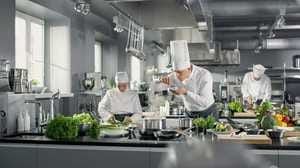
Restaurants and other facilities in the food and beverage industry in the Atlanta metro area of Georgia always need every single employee to do his or her job to keep everything running smoothly. There is no shortage of hazards in restaurant and hotel kitchens, and identifying them can make it easier to take precautions.
Your employer is responsible for the safety and health of all the employees. However, the multitude of things that could go wrong in a busy kitchen requires you and your co-workers to look out for potential hazards and deal with them.
Crowded, dirty work areas
The bigger the rush in the kitchen, the more crowded it becomes, and the following steps can ease the pressure:
- Establish a workflow pattern that spaces the cooks throughout the kitchen instead of all in one area.
- Ensure that walkways and work surfaces are free of clutter.
- Remove empty containers and boxes immediately to prevent trip-and-fall accidents.
Clutter is not the only thing that can cause a fall. Oily restaurant floors make them slippery. The following precautions are essential:
- Clean spills immediately to prevent slip-and-fall injuries.
- Ask your employer to make floors safer by installing non-slip flooring.
- Avoid carrying large containers of hot oil or liquid. It is much safer to wheel large buckets or pots on carts.
Small ramps or a layer of bright paint can help to prevent falls where floor surfaces are uneven.
Chemical and burn hazards
The prevalence of chemicals and hot oils, liquids, foods, and hot surfaces increase the potential for spattering and spills that could cause burn injuries. You can take the following steps to prevent mishaps:
- Keep the area around the eyewash station clear to allow quick access if you should get splashed with chemicals.
- If you are a cook, have a ready supply of side towels and oven gloves and also hot pads to prevent burns by hot pots and pans.
- Wear proper chef jackets with long sleeves and aprons with bibs as protection.
- Be aware of the burn hazards posed by sanitizers and cleaning supplies, and make the data safety sheets available to all.
Have a fully equipped first aid kit that includes treatment for cuts and burns.
Equipment and machinery safety
To prevent injuries involving commercial kitchen equipment:
- Provide access to the safety manual for the kitchen equipment, and follow the manufacturer’s instructions when operating dangerous machines.
- Snug gloves that cover the hands and wrists can prevent injuries caused by sharp blades of motorized slicers and mandolins.
- Take note that the moving parts of machines can catch loose-fitting clothing.
- Never remove the safety guards of machines, and don’t let anyone clean equipment without first unplugging it.
These are only some of the dangers you face.
What to do if you suffer an injury
Despite all the steps you take to ensure safety, accidents still can happen. If you injured, you might be entitled to benefits provided by the state-regulated workers’ compensation insurance system. An experienced Georgia workers’ comp attorney can help you navigate the claims process.



